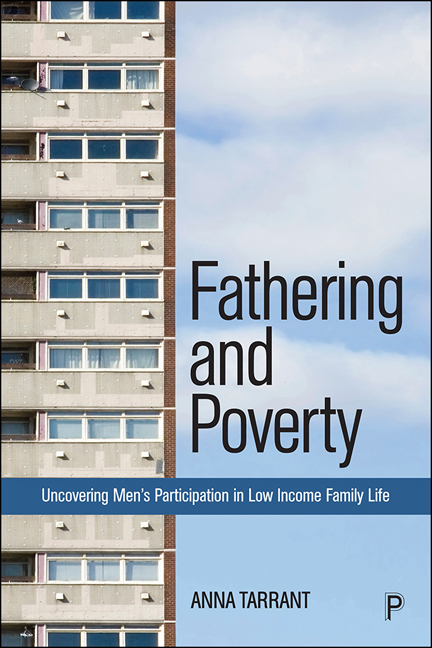Book contents
- Frontmatter
- Dedication
- Contents
- List of figures and tables
- List of abbreviations
- About the author
- Acknowledgements
- 1 Introduction: Fathering, poverty, families and policy
- 2 Low-income fatherhoods in historical and political context
- 3 Theorising men’s participation in low-income families
- 4 Supporting men in low-income contexts: practitioner observations
- 5 Men’s caring arrangements and family trajectories
- 6 Familial economic circumstances and provisioning practices
- 7 Men’s family participation in low-income urban neighbourhoods
- 8 Conclusion: Men’s family participation in low-income contexts
- Appendix A Participant information
- Appendix B ‘Existing evidence’ document shared at the knowledgeexchange workshop
- Notes
- References
- Index
2 - Low-income fatherhoods in historical and political context
Published online by Cambridge University Press: 30 April 2022
- Frontmatter
- Dedication
- Contents
- List of figures and tables
- List of abbreviations
- About the author
- Acknowledgements
- 1 Introduction: Fathering, poverty, families and policy
- 2 Low-income fatherhoods in historical and political context
- 3 Theorising men’s participation in low-income families
- 4 Supporting men in low-income contexts: practitioner observations
- 5 Men’s caring arrangements and family trajectories
- 6 Familial economic circumstances and provisioning practices
- 7 Men’s family participation in low-income urban neighbourhoods
- 8 Conclusion: Men’s family participation in low-income contexts
- Appendix A Participant information
- Appendix B ‘Existing evidence’ document shared at the knowledgeexchange workshop
- Notes
- References
- Index
Summary
The extent to which men's relationships and lived experiences in low-income families and contexts have been addressed in academic debates and discussion is examined in this chapter. Superficial readings of interdisciplinary literatures that engage with questions of men, poverty and family and community life show that they make strong assertions that men's experiences are a key area of empirical neglect. Yet, these observations only serve to re-enforce, rather than address, their invisibility.
Drawing on an interdisciplinary scholarship from social history, sociology, social policy and social geography, the questions of how and why the social and relational dynamics and lived experiences of men in low-income families and contexts are often rendered invisible are interrogated. In-depth engagement with the literature explains the dominant and historically rooted policy preoccupation with fathers living in low-income families, which locates them within ‘problem’ and ‘underclass’ families, considers them absent, and relegates them to the margins of social and familial lives in the low-income localities and communities of urban Britain. This history has predominantly steered and underscored contemporary academic interest in the cultural politics of representational contexts and the sustained focus on crisis and father absence. While it is not possible to provide an exhaustive account of the histories and evolving policy contexts that have rendered empirical accounts of low-income fathers invisible in this chapter, tracing their development and intersections is vital to a more comprehensive understanding of men's family participation in low-income families over time.
Bridging these disciplines further serves to highlight the limitations of existing knowledge and understanding, as well as the fragmented and partial character of empirical focus on low-income men, their familial identities and the social, relational and temporal character of their family participation. Insightful pockets of research, ranging from classic urban community studies conducted in Britain to contemporary international contexts, are drawn together to situate the findings of the MPLC study within this broader historical, political and geographical terrain.
Concepts of absence and presence are also critiqued further, particularly in the context of discussions about fatherhood which define the current state of debate. A case is made in this chapter to bring evidence of the relational and social dimensions of men's lives in low-income contexts more fully into view.
- Type
- Chapter
- Information
- Fathering and PovertyUncovering Men's Participation in Low-Income Family Life, pp. 31 - 54Publisher: Bristol University PressPrint publication year: 2021



